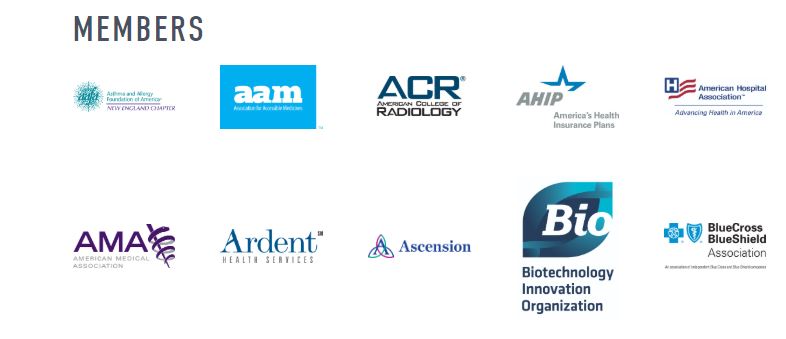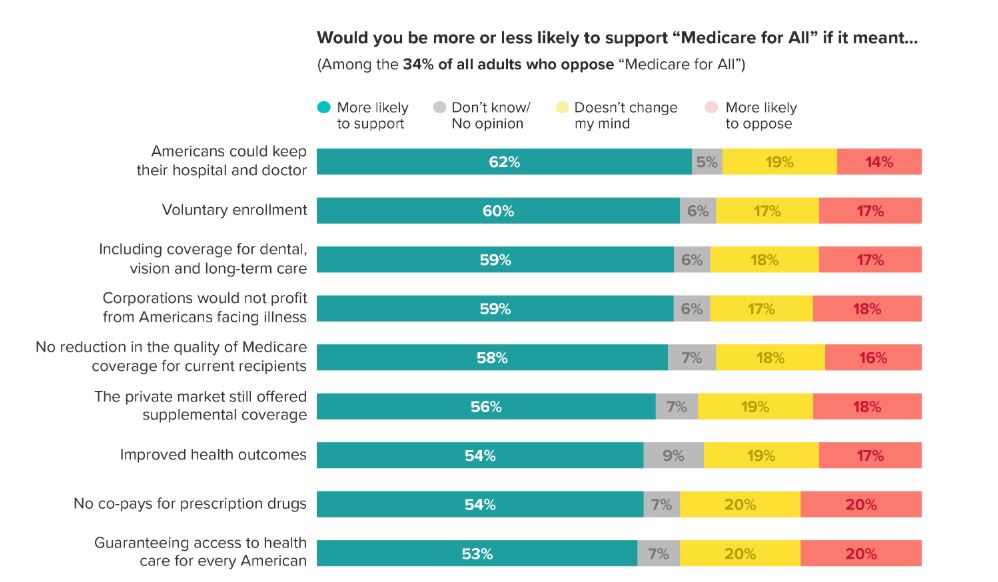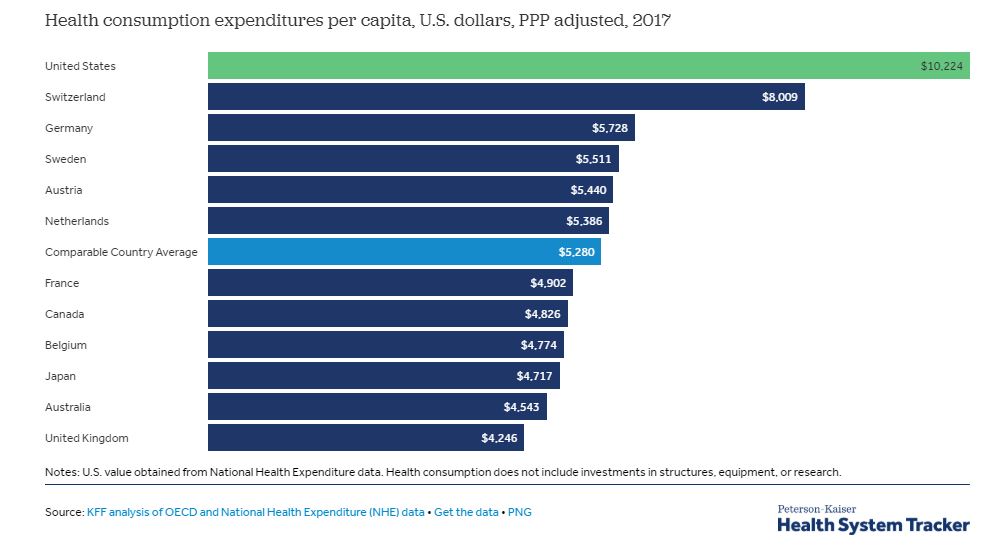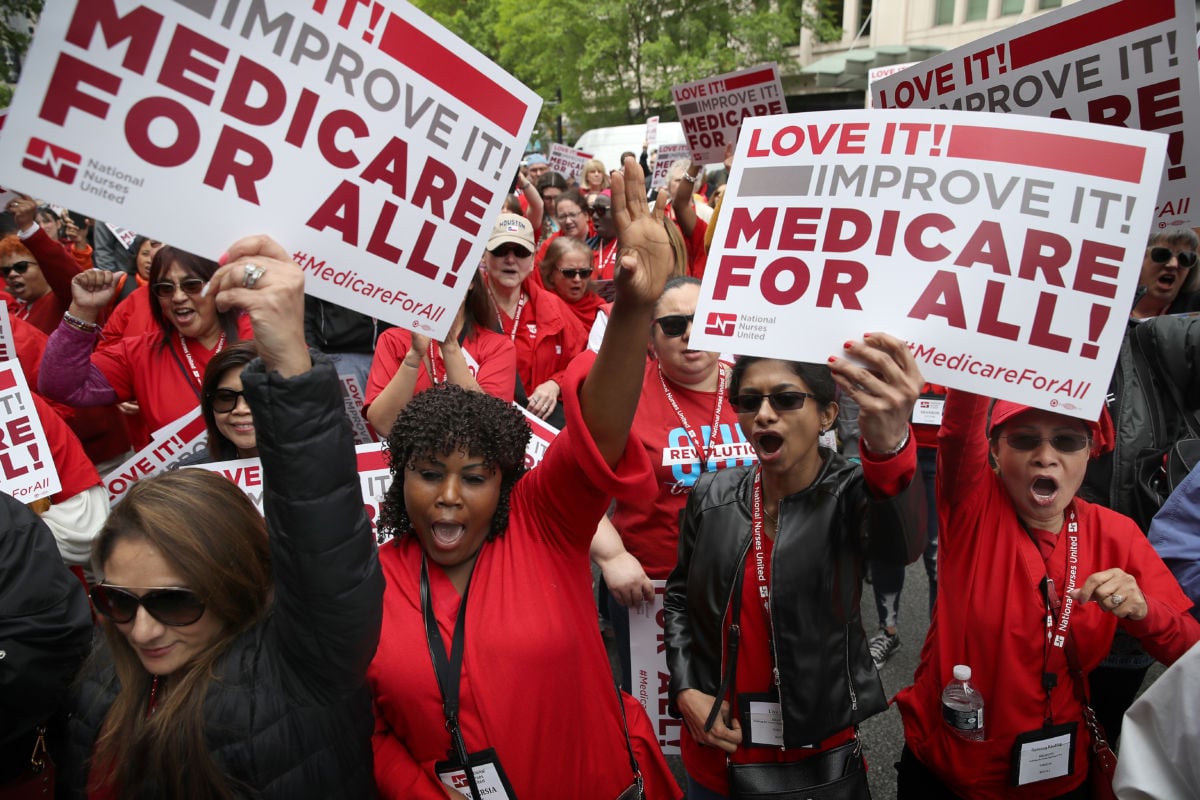Opponents of Medicare for All have a difficult task ahead of it heading into the 2020 election: They must convince Americans that they don’t want a Medicare for All health care system that would guarantee them and their family health care security regardless of circumstances. The for-profit health industry must achieve this in spite of the cruelty and inefficiency of the current multipayer system and more than a decade of polling showing popular support for Medicare for All.
To do this, the industry has lobbied, donated and provided talking points to members of both parties and the press, in order to shape the public debate. In today’s hearing on Medicare for All in the House Ways and Means committee we will likely hear industry talking points in spades from members of Congress and in subsequent press coverage.
This service to the industry doesn’t come cheap. Chairman of the House Ways and Means Committee, Democratic Rep. Richard Neal (one of the industry’s favorite Democrats), for instance, has received $2.4 million in his career from the for-profit health care industry. For the major industry powerbrokers, these expenses are a necessity if they hope to fend off the momentum of the single-payer movement.
The for-profit health industry is aware that support for a national health system like Medicare for All has risen in recent years, along with unprecedented grassroots energy. Moreover, health care costs rank as the biggest concern among Americans. Resistance is almost entirely driven by the for-profit health industry, who work to portray the illusion of widespread opposition to — and fear of — a national health system. Corporate media outlets have helped them tremendously along the way.
This isn’t a fair fight for progressives. The opposition to single-payer has deep pockets. The Partnership for America’s Health Care Future (PAHCF), probably the most prominent coalition of private companies and trade associations, is spending aggressively. It is made up of dozens of industry lobbies, including America’s Health Insurance Plans, the American Hospital Association, and Pharmaceutical Research and Manufacturers of America, among other industry giants. A large part of the strategy, according to documents leaked to The Intercept, is “earned media,” or reports and articles they helped push into existence to support their agenda or repeat their talking points and statistics.
Here is where the industry is having the most success shaping the national debate over health care policy. Corporate media have enabled the industry’s efforts to keep health care in the hands of profiteers rather than the people. In fact, journalists and pundits often include the very same critiques leveled endlessly by the industry and its “astroturf” groups. It is not uncommon to see the press and industry share nearly identical bullet points, including deceptive reporting on polling, the prospect for alternatives to single-payer, and the impact it might have on the electability of Democrats in 2020.
The PAHCF releases email blasts and memos that make life easy for health care writers under a tight deadline by providing them content, sourcing and quotations — all of them critical of single-payer and much of it out of context or factually dubious. PAHCF then writes blog posts about these articles or other industry-funded studies to give the reinforcing effect of anti-single-payer views. For instance, the Partnership cites studies from vested interests, such as the American Hospital Association and the Federation of American Hospitals.

Americans and Private Insurance
The most common argument made against single-payer has been the claim that Americans love their private insurance and do not want to lose it. It is true that support for Medicare for All wavers if a follow-up question adds that the system would “force you to lose your private insurance.”
The wording of polls can have a strong impact on the results of Medicare for All. But this works both ways. An April 22 poll from Morning Consult, for instance, shows that the public is much more likely to support single-payer if it would involve “increasing taxes on the wealthy.”
Among the 34 percent of respondents opposed to Medicare for All, the Morning Consult poll shows, 62 percent said they would be more likely to support it “if Americans could keep their hospital and doctor.” They are 59 percent more likely to support the policy (only 18 percent more likely to oppose) if it means corporations would not profit from Americans facing illness.
Clearly, eliminating private insurance is not the only relevant variable. It is just the variable the industry uses selectively to dismiss national consensus. This narrative, pushed by health care lobbies, is constantly repeated by politicians and the press.
For instance, on June 7, PAHCF released an email blast that critiqued Sen. Bernie Sanders for “falsely claiming” Medicare for All is popular. The article links to five negative stories from the past week as supposed evidence of single-payer’s great flaws. This includes an op-ed from Lauren Crawford Shaver, executive director of PAHCF, in The Hill on June 1. The author biography notes Shaver “has worked on numerous Democratic political campaigns over the last decade,” and has served as the deputy assistant secretary for public affairs in health care at the U.S. Department of Health and Human Services.

Viability of Alternative Plans for Universal Health Care
Another narrative pushed by the industry with help from politicians and the press is to promote alternatives to single-payer, namely “improving” the Affordable Care Act. The argument is that there are many ways to cover everyone in the existing system. Why get all invested in one of these mechanisms?
“Purity tests aside, there are many ways to achieve [universal health care], including ones that are likely to face less political resistance,” wrote Washington Post columnist Catherine Rampell in a February op-ed.
Virtually all critics of Medicare for All, including the health insurance industry, claim to support “universal care.” Yet, despite Rampell’s pleas, none of the alternative proposals in Congress have a direct path to universality. This fact is virtually always omitted from mainstream coverage. The Republican position was to throw 23 or so million people off insurance — this regressive version of Trumpcare has just 12 percent support among the population. The primary alternative posed by Democrats is a public option or Medicaid buy-in program. Several iterations of this have been introduced, some weaker than others. It would allow some to “buy in” to Medicaid.
The only analysis the Congressional Budget Office has done on a public option showed it would only have “minimal effects” on access. Even potentially stronger versions do not exert enough savings to expand coverage to all if they leave the commodified, wasteful private system in place.
“[Public option or ‘buy-in’ proposals] would retain multiple payers and therefore sacrifice much of the administrative savings available under single-payer plans,” according to a June 4 report in the Annals of Internal Medicine. The report is written by Steffie Woolhandler and David Himmelstein, both co-founders of Physicians for a National Health Program and lecturers at Harvard Medical School. “These plans would cover only a fraction of uninsured persons, few of whom could afford the premiums … [and] do little to improve the comprehensiveness of existing coverage.”
The Partnership coalition opposes these buy-in proposals, but in doing so, helps give them viability by grouping them with Medicare for All.
“Whether you call it Medicare for All, Medicare buy-in, single-payer or a public option [they all] move us toward a one-size-fits-all health care system that is wrong for America,” the organization argued in a recent blog post. This language gives the impression that the buy-in proposals (sometimes called “Medicare for More” or “Medicare for Some”) are bold, transformational plans for universal health care, much like the single-payer proposals in Congress.
In any case, this argument overlooks the issue of costs. Despite efforts to paint Medicare for All as hopelessly expensive, according to numerous studies, it is a cheaper option than doing nothing. This is because single-payer financing allows for economies of scale, a wider risk pool and better bargaining power for drugs, administrative savings and eliminating the expensive private insurance companies who serve as middlemen.
Evidence exists for this all over the world, where single-payer health care (or a strong equivalent) is the norm. “The U.S. spends more per person on health than comparable countries,” according to a recent analysis by the Kaiser Family Foundation (KFF). Health spending per person in the U.S. was $10,224 in 2017, which was 28 percent higher than Switzerland, the next highest per capita spender.” The United Kingdom has universal care and spends just $4,246 per person. The average “comparable country,” as defined by KFF, spends $5,280, just more than half of what the U.S spends.
The efficiencies of a public, national health system make universal health care possible. Alternatives — whether proposed by Democrats, Republicans or the industry itself — have no direct pathway to universality. Still, the narrative is that small tweaks and improvements are practical while big plans are painted as naive.

Is Single-Payer an Electoral Liability for Democrats?
The industry has made an especially strong impact on the Democratic Party, where the party establishment — including its leadership in Congress — continues to try and portray the policy as a major electoral liability.
The corporate-funded group Third Way, composed of conservative Democrats with ties to corporate money, wrote a memo in March urging candidates to avoid running on the issue.
“It costs $32 trillion over ten years and puts workers on the hook,” the memo warns, citing a study from a libertarian think tank with ties to the Koch brothers. “Anything like Sanders-style single payer is ripe for attack.” This is not the first time we have seen an alliance between the Kochs and New Democrats, and recent reports suggest it may not be the last.
“If you go too far left, Donald Trump gets re-elected and Republicans control both houses of Congress,” said Jim Kessler, executive vice president for policy at Third Way, in an interview with The New York Times. The press and its sources float the old trope that policies in the “center” have wider appeal, which is very much disputed.
In the mainstream media, we see this trope everywhere: a Paul Krugman column, a quotation from a New Democrat or industry executive, a pundit on cable television. A particularly egregious example is Michelle Cottle, an editorial board member for The New York Times, describing Rep. Alexandria Ocasio-Cortez and other supporters of single-payer as children who must be “reined in” by the “adult in the room,” House Speaker Nancy Pelosi.
Pelosi has long been a recipient of large donations from the health industry, according to the Center for Responsive Politics. She has also vigorously defended the for-profit health system as Speaker of the House. In particular, she has been hostile toward progressive ideas like Medicare for All and the Green New Deal. She does so despite (not because of) her claim that the party is “not there yet.” There is no ambiguity about how Democrats feel about the issue. Polls show as many as 85 percent of Democrats support Medicare for All, and a majority prefer socialism to capitalism.
The 2016 election involved nominating the archetype moderate for the Democratic Party. Pollsters, including The New York Times, gave Hillary Clinton extremely high chances of winning the election (70-99 percent) on Election Day. It was clear by the next morning that they misread the electoral map.
Still, many continue to push this assumption as if the 2016 election did not reflect changing and increasingly anti-establishment views of the public, on the left and right. Polls in 2016, for instance, showed Sanders performing better against Trump in the general election than Clinton. The press rationalized these polls must be wrong.
Given the massive financial advantage the health industry has over advocates, the country depends on an adversarial media to confront — and not enable — these deceptions about Medicare for All. Sadly, the bulk of the coverage in the mass media repeats deceptive claims from the very people who profit from the sick.
Speaking against the authoritarian crackdown
In the midst of a nationwide attack on civil liberties, Truthout urgently needs your help.
Journalism is a critical tool in the fight against Trump and his extremist agenda. The right wing knows this — that’s why they’ve taken over many legacy media publications.
But we won’t let truth be replaced by propaganda. As the Trump administration works to silence dissent, please support nonprofit independent journalism. Truthout is almost entirely funded by individual giving, so a one-time or monthly donation goes a long way. Click below to sustain our work.
